Pal Joey Blu-ray Movie
HomePal Joey Blu-ray Movie 
Twilight Time | 1957 | 109 min | Not rated | Feb 14, 2012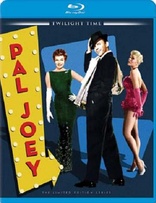
Movie rating
6.5 | / 10 |
Blu-ray rating
| Users | 3.5 | |
| Reviewer | 4.0 | |
| Overall | 3.7 |
Overview
Pal Joey (1957)
Nightclub singer Joey Evans has big dreams of starting his own nightclub. Despite a meaningful connection with chorus girl Linda English, he begins seducing Vera Simpson, a wealthy widow and ex-burlesque dancer he hopes will provide financial backing for his club.
Starring: Rita Hayworth, Frank Sinatra, Kim Novak, Barbara Nichols, Bobby SherwoodDirector: George Sidney (II)
| Romance | Uncertain |
| Drama | Uncertain |
| Musical | Uncertain |
Specifications
Video
Video codec: MPEG-4 AVC
Video resolution: 1080p
Aspect ratio: 1.85:1
Original aspect ratio: 1.85:1
Audio
English: DTS-HD Master Audio 5.1 (48kHz, 24-bit)
English: DTS-HD Master Audio 2.0 (48kHz, 24-bit)
Music: DTS-HD Master Audio 2.0
Subtitles
English SDH
Discs
50GB Blu-ray Disc
Single disc (1 BD)
Playback
Region free
Review
Rating summary
| Movie | 4.0 | |
| Video | 4.0 | |
| Audio | 4.0 | |
| Extras | 2.0 | |
| Overall | 4.0 |
Pal Joey Blu-ray Movie Review
Rodgers and. . .who?
Reviewed by Jeffrey Kauffman February 28, 2012The film version of The Sound of Music has a lot of achievements to its credit. It pretty much single handedly
brought 20th Century Fox back from the brink of bankruptcy after the debacle that was Cleopatra. It was in
many ways the last big family musical blockbuster, capping an era that had been going strong since at least the Golden
Era of Hollywood. With five Oscar wins, countless tens of millions in box office receipts, ancillary profits that have
stretched from the long playing record to CD, from VHS to Blu-ray, also stuffing its coffers, The Sound of Music
has earned its joking alternate title of The Sound of Money. (We’ll set aside for a moment co-star
Christopher Plummer’s somewhat less monetarily themed alternate title for the film, The Sound of Mucous.) But
one sort of weird achievement that can be traced to The Sound of Music is that an entire couple of generations
has become so firmly imprinted with the musical’s iconic pairing of Rodgers and Hammerstein that many of them are
completely unaware that Richard Rodgers had had a long and extremely productive compositional life long before his
collaboration with Oscar Hammerstein II, including another iconic pairing with another legendary lyricist, Lorenz Hart.
Hart was in some ways a cleverer (which is not to say better) lyricist than Hammerstein, and if the
Rodgers and Hammerstein oeuvre was often kind of rural and folksy, the Rodgers and Hart oeuvre is
often decidedly more urban and sophisticated. Rodgers wasn’t the easiest man in the world to work with (as even his
family is on record stating), but his collaboration with Hart was especially tumultuous, something probably more
attributable to Hart’s drinking problem and erratic working habits than to any prickliness on Rodgers’ part. The team
was nearing the end of their incredibly fruitful and successful professional relationship when they adapted John
O’Hara’s Pal Joey for the stage in 1940, but the musical’s incipient cynicism may have been the biggest
impediment to it making it to the screen right away. It wasn’t until 1957 that a film version of Pal Joey
appeared, and even then it was not the original Rodgers and Hart conception, but instead a somewhat bowdlerized
and Hollywoodized amalgamation that played to star Frank Sinatra’s strengths while eschewing some of the salient
characteristics about Joey Evans that Sinatra was certainly capable of playing.
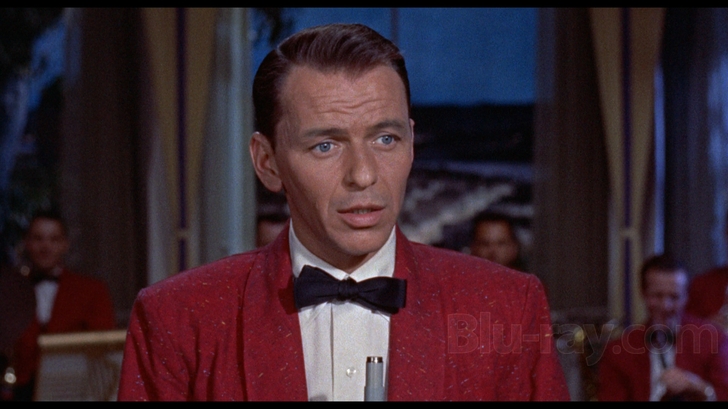
Pal Joey initially sprang to life as a series of New Yorker short stories by John O’Hara, which were then stitched together as a novel, one which consisted entirely of letters supposedly written by Joey to his friend Ted. Joey was a down on his luck nightclub entertainer who had a somewhat cracked moral compass, but who was a likable guy nonetheless. O’Hara himself brought the material to Rodgers and Hart and suggested a musical adaptation, offering to write the book (libretto) himself. The musical version saw Joey (played in the original Broadway version by a newcomer named Gene Kelly) on the make with a wealthy socialite, one he feels can set him up in business with his own nightclub, while he simultaneously woos a more innocent girl. Joey is a cad, a user who’s constantly scheming to latch on to that next rung on the ladder of success, and as such he bears a certain similarity to another anti-hero whose story was musicalized some two decades later, Budd Schulberg’s Sammy Glick, who came to life in the person of Steve Lawrence in the musical What Makes Sammy Run?. Both Sammy and Joey have a rather jaundiced view of show business, and both posit a pretty venal lead character at the core of their stories.
Joey is a fantastic role for any actor, and it catapulted Kelly to overnight stardom (it also provided Bob Fosse with his only acting Tony nomination for a revival in the early sixties). Sinatra was a perfect choice to play the role, at least in terms of persona if not the original conception of the character (Joey was a dancer, not a singer, in the Broadway version), but for whatever reason, the filmmakers decided to soften Joey’s rougher edges, making him a charming scoundrel more than a scheming womanizer. The fact that Sinatra was also at the top of his game vocally makes any attempt to paint Joey as “second rate” laughable, something that would ironically color Fosse’s film version of Cabaret years later, when the supposedly talentless Sally Bowles was inhabited by the stellar Liza Minnelli. Scenarist Dorothy Kingsley twists and turns various characters around, and jettisons several of the Rodgers and Hart tunes that graced the original stage version, while at the same time inserting a handful of their classics from some of their other shows. In other words, if you know the stage Pal Joey, the film will seem like a somewhat strange mélange; if you’ve never seen the stage version, the film perhaps is a bit more cohesive and less bothersome.
In this somewhat bewitched, bothered and bewildered (to quote one of the classic Rodgers and Hart songs form the score) reworking of Pal Joey, Kim Novak portrays Linda English, the “innocent” from the original version, now transported from a life of stenography to being a nightclub dancer with aspirations of singing. Rita Hayworth is the other above the title billed star, playing Vera Simpson, the wealthy society dame who agrees to fund Joey’s plans for a nightclub, but who in this film version is given the patently odd back story of having been a stripper, seemingly for the sole reason of having Hayworth perform the delectable “Zip”. Several minor characters from the stage version have been completely jettisoned, and a couple of others have been rethought. A whole subplot is also missing in action, and the bulk of this film is a sort of strange ménage a trois, interrupted now and again for nightclub performances (something this film has in common with Fosse’s film version of Cabaret), with the only real plot arc being whether Joey will choose Vera or Linda, or neither (without spoiling anything, it’s noteworthy that the original stage version gives this “choice” to the women).
This is a colorful and brash musical entertainment, lifted miles above its kind of turgid elements due to the star power of its lead trio, as well as some knock your socks off arrangements by Sinatra’s leading collaborator of that time, Nelson Riddle. Even though Sinatra, Novak and Hayworth are all immensely winning in their roles, the music here is undoubtedly one of the chief allures of this film, and Riddle’s inventive reimaginings of these Rodgers and Hart classics are elegant showpieces not just for Sinatra’s mature vocalizing, but for the art of orchestration itself (actual orchestration duties fell to Arthur Morton). (Neither Hayworth nor Novak did their own singing, not to state the obvious.) This may not be the “real” Pal Joey in any sense of the word, but it still remains one of Sinatra’s best screen outings. Sinatra certainly could have played the character as originally written (albeit probably without the demanding dance elements), but even toned down here for this “kinder, gentler” approach, he manages to convey a bit of Joey’s smarm lying just beneath the charming surface.
Pal Joey Blu-ray Movie, Video Quality 
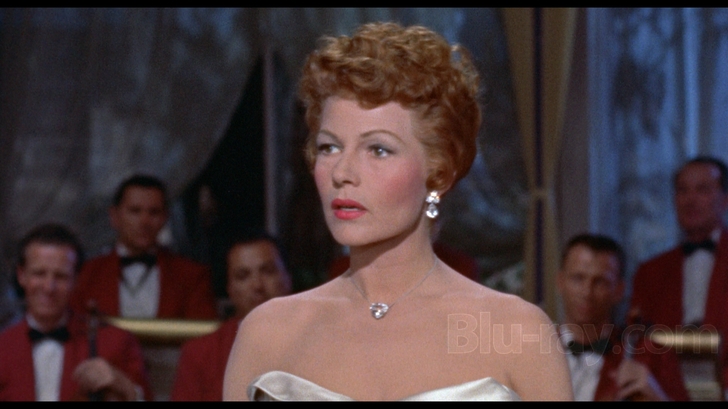
Pal Joey is presented on Blu-ray courtesy of Twilight Time with an AVC encoded 1080p transfer in 1.85:1. As has been mentioned before in other Twilight Time reviews, the niche label is at the mercy of the studios from whom they license these titles, and this Columbia release, while incredibly colorful and vivid looking, also is one of the softest looking transfers released by the label in its short history. There's nothing bad here, certainly nothing to be overly concerned about, but a lot of this film is just slightly gauzy, something increased exponentially in the opticals, including (obviously) the credits sequence as well as the big fantasy sequence that caps the film. The pluses far outweigh the negatives here, with some incredibly lushly saturated color, and excellent fine detail which brings out every nuance in the stunning Jean Louis costumes.
Pal Joey Blu-ray Movie, Audio Quality 
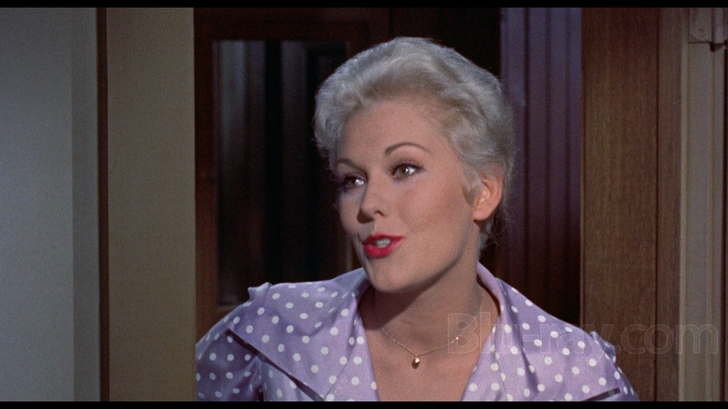
Pal Joey's soundtrack is offered in two lossless mixes, a DTS-HD Master Audio 5.1 surround mix and a DTS-HD Master Audio 2.0 mix (limited separation probably processed stereo according to Twilight Time's Nick Redman). Fidelity here is quite good, but it must also be stated for the record that some of the dubbed singing sounds noticeably boxier than the bulk of the soundtrack (listen especially to the women in the opening "Rainbow" production number for a very good example). The 5.1 mix isn't overly immersive, but the music is opened up rather nicely in this mix, and occasionally some ambient environmental sound effects will dot the surrounds, adding a bit of spaciousness to the proceedings. The music sounds spectacular for the most part, and Sinatra's voice is magnificent, reproduced with all of its slightly aged luster.
Pal Joey Blu-ray Movie, Special Features and Extras 
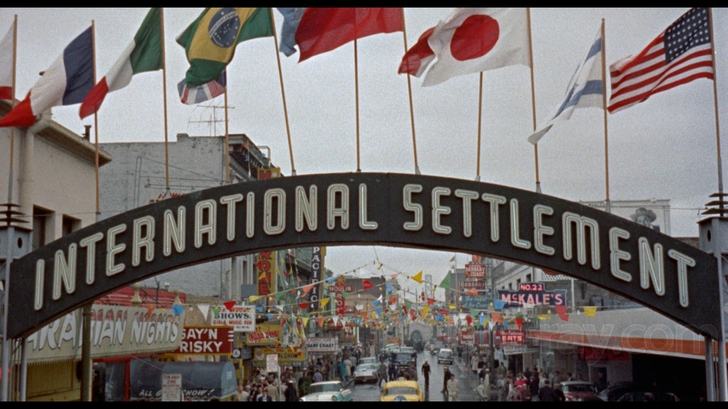
- Kim Novak Backstage Featurette (HD; 9:28). This is a really interesting, albeit way too brief, visit with Kim at her Oregon hideaway, where she reminisces about costume designer Jean Louis, as well as how the pressures of Hollywood actually helped her to continue working on her painting, something she still is involved with. Novak comes off as charming and down to earth, with absolutely no illusions (or delusions) of being a "big star".
- Original Theatrical Trailer (HD; 4:59). This is a Sinatra hosted longer than usual trailer. It sports pretty ragged looking video but is fun to watch nonetheless.
- Isolated Score Track is presented in mono via a splendid sounding DTS-HD Master Audio 2.0 mix. (Some online sites reported the isolated score as being released here in stereo, but I've confirmed with Twilight Time—and my own ears —that this is in mono.)
Pal Joey Blu-ray Movie, Overall Score and Recommendation 
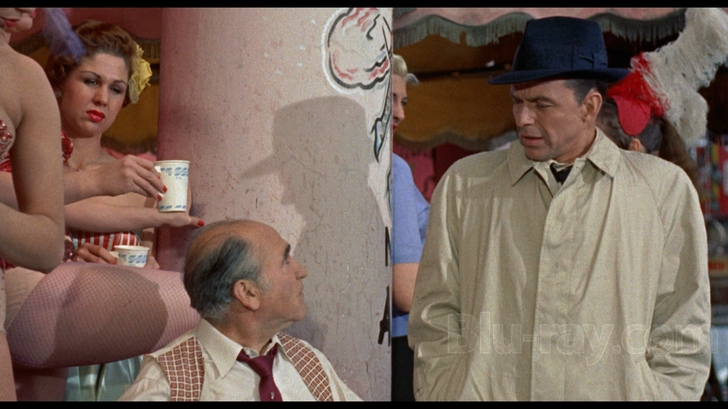
For you "young 'uns" out in the reading audience who are only familiar with Rodgers and Hammerstein, you have a veritable universe of fantastic music to discover in the pairing of Rodgers and Hart. There's no finer filmic place to start than this colorful musical. No, this isn't "really" Pal Joey, and some of the changes seem a bit odd, especially since Sinatra could have easily pulled off a less likable character. But this 1957 musical is brash, well staged, and features three big "movie star" performances from Sinatra, Hayworth and Novak. With good quality video and audio, and a really appealing (if short) featurette, this release comes Highly recommended.
Similar titles
Similar titles you might also like

Nine
2009

Burlesque
2010

San Francisco
Warner Archive Collection
1936

Rent
2005

The Last Five Years
2014

In the Good Old Summertime
Warner Archive Collection
1949

Cabaret
Reissue
1972

A Star Is Born
1954

Dirty Dancing: Havana Nights
2004

Gentlemen Prefer Blondes
1953

Saawariya
2007

There's No Business Like Show Business
1954

Dance, Girl, Dance
1940

Idlewild
2006

Ziegfeld Girl
Warner Archive Collection
1941

Miss Sadie Thompson 3D
Limited Edition to 3000
1953

Yankee Doodle Dandy
Warner Archive Collection
1942

Smash: The Complete First Season
2012

Lili
Warner Archive Collection
1953

Across the Universe
2007
